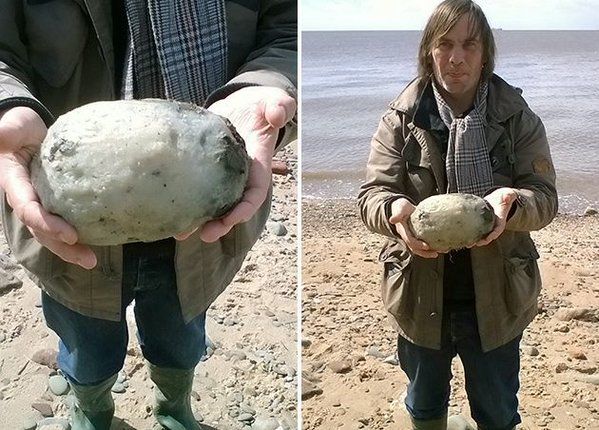
A couple in the U.K. have entered negotiations, with potential buyers, after stumbling across a valuable piece of whale vomit during a stroll on the beach
A key ingredient in whale vomit— or ambergris, to be exact—makes it perfect for high-end fragrances, thanks to its ability to make scents last longer. Ambergris is wax-like substance that originates as a secretion in the intestines of the sperm whale, often found floating in tropical seas and used in perfume manufacture.
But it rarely washes up on British shores and, according to previous examples of vomit, this 1.57kg lump is estimated to be worth up to $70,000.
Gary and Angela Williams, from Lancashire, in the north east of England, were strolling along Middleton Sands beach when they smelled something bad.
"It was down a section of the beach where no one really walks," Gary Williams told The Mirror. "It's a very distinctive smell, like a cross between squid and farmyard manure."
As Johnna Rizzo, from National Geographic, explains, no one really knows for sure the exact origins of ambergris, but it is thought to be secreted in the bile duct and intestines of sperm whales, to ease stomach or throat irritants. The waxy substance likely greases up anything stuck inside a whale's digestive system, which allows it to be vomited back out.
Exactly where it gets vomited out is unknown, but researchers are increasingly looking into the possibility that it comes out the back end, not the front.
"It was once thought the ambergris was ejected by mouth. As of now, the argument seems to be weighted toward the back end of the whale," says Rizzo.
The U.K. pair reportedly knew what ambergris is, and figured their discovery had a certain "whale vomit" look about it, so they wrapped it up in a scarf and took it home.
In 2013, a 2.7kg lump found washed up on a British beach was valued by experts at up to £120,000 ($170,000), while last year, in September, a 1.1 kg piece found on a beach in Wales was bought for £11,000 ($15,500.)
"It feels like a rock hard rubber ball. Its texture is like wax, like a candle. When you touch it you get wax sticking to your fingers," Williams said.
According to National Geographic , it is illegal to use ambergris to produce perfumes in the U.S., due to sperm whales being endangered, but it is still a big thing in France and Lanvin and Chanel famously use the substance to make their fragrances last longer on the skin.
Uncommon Knowledge
Newsweek is committed to challenging conventional wisdom and finding connections in the search for common ground.
Newsweek is committed to challenging conventional wisdom and finding connections in the search for common ground.
About the writer
To read how Newsweek uses AI as a newsroom tool, Click here.








